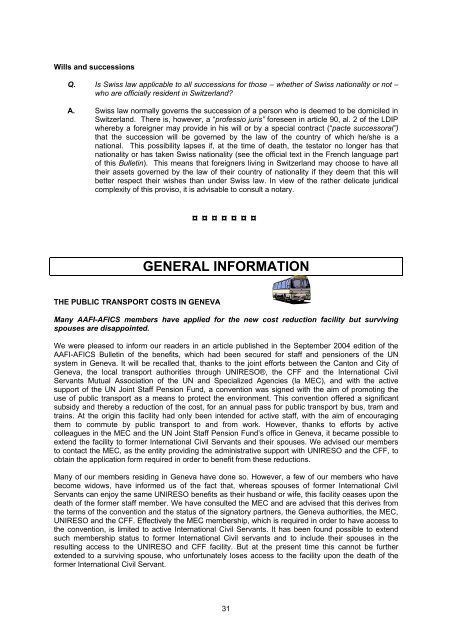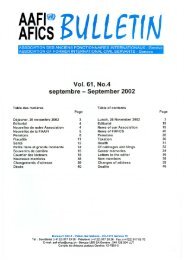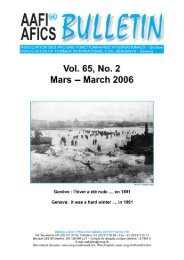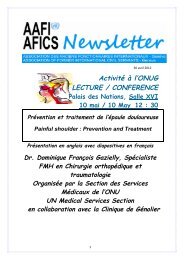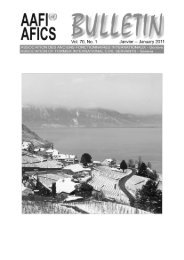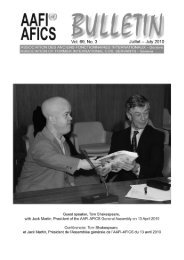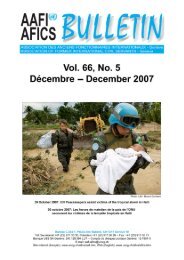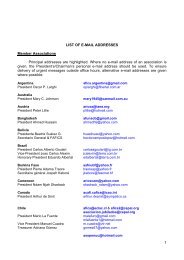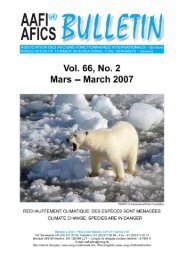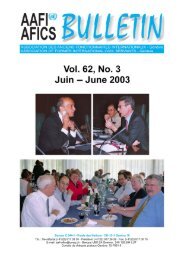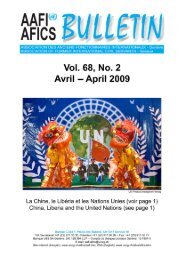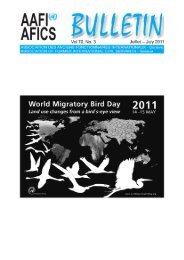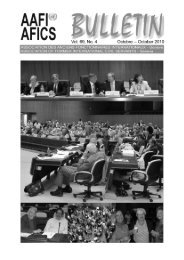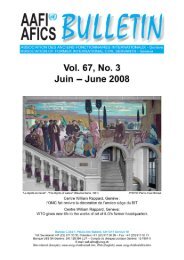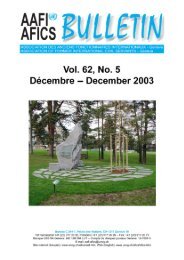Bulletin Vol. 64 no. 2 - AAFI-AFICS, Geneva - UNOG
Bulletin Vol. 64 no. 2 - AAFI-AFICS, Geneva - UNOG
Bulletin Vol. 64 no. 2 - AAFI-AFICS, Geneva - UNOG
You also want an ePaper? Increase the reach of your titles
YUMPU automatically turns print PDFs into web optimized ePapers that Google loves.
Wills and successions<br />
Q. Is Swiss law applicable to all successions for those – whether of Swiss nationality or <strong>no</strong>t –<br />
who are officially resident in Switzerland?<br />
A. Swiss law <strong>no</strong>rmally governs the succession of a person who is deemed to be domiciled in<br />
Switzerland. There is, however, a “professio juris” foreseen in article 90, al. 2 of the LDIP<br />
whereby a foreigner may provide in his will or by a special contract (“pacte successoral”)<br />
that the succession will be governed by the law of the country of which he/she is a<br />
national. This possibility lapses if, at the time of death, the testator <strong>no</strong> longer has that<br />
nationality or has taken Swiss nationality (see the official text in the French language part<br />
of this <strong>Bulletin</strong>). This means that foreigners living in Switzerland may choose to have all<br />
their assets governed by the law of their country of nationality if they deem that this will<br />
better respect their wishes than under Swiss law. In view of the rather delicate juridical<br />
complexity of this proviso, it is advisable to consult a <strong>no</strong>tary.<br />
¤¤¤¤¤¤¤<br />
GENERAL INFORMATION<br />
THE PUBLIC TRANSPORT COSTS IN GENEVA<br />
Many <strong>AAFI</strong>-<strong>AFICS</strong> members have applied for the new cost reduction facility but surviving<br />
spouses are disappointed.<br />
We were pleased to inform our readers in an article published in the September 2004 edition of the<br />
<strong>AAFI</strong>-<strong>AFICS</strong> <strong>Bulletin</strong> of the benefits, which had been secured for staff and pensioners of the UN<br />
system in <strong>Geneva</strong>. It will be recalled that, thanks to the joint efforts between the Canton and City of<br />
<strong>Geneva</strong>, the local transport authorities through UNIRESO®, the CFF and the International Civil<br />
Servants Mutual Association of the UN and Specialized Agencies (la MEC), and with the active<br />
support of the UN Joint Staff Pension Fund, a convention was signed with the aim of promoting the<br />
use of public transport as a means to protect the environment. This convention offered a significant<br />
subsidy and thereby a reduction of the cost, for an annual pass for public transport by bus, tram and<br />
trains. At the origin this facility had only been intended for active staff, with the aim of encouraging<br />
them to commute by public transport to and from work. However, thanks to efforts by active<br />
colleagues in the MEC and the UN Joint Staff Pension Fund’s office in <strong>Geneva</strong>, it became possible to<br />
extend the facility to former International Civil Servants and their spouses. We advised our members<br />
to contact the MEC, as the entity providing the administrative support with UNIRESO and the CFF, to<br />
obtain the application form required in order to benefit from these reductions.<br />
Many of our members residing in <strong>Geneva</strong> have done so. However, a few of our members who have<br />
become widows, have informed us of the fact that, whereas spouses of former International Civil<br />
Servants can enjoy the same UNIRESO benefits as their husband or wife, this facility ceases upon the<br />
death of the former staff member. We have consulted the MEC and are advised that this derives from<br />
the terms of the convention and the status of the signatory partners, the <strong>Geneva</strong> authorities, the MEC,<br />
UNIRESO and the CFF. Effectively the MEC membership, which is required in order to have access to<br />
the convention, is limited to active International Civil Servants. It has been found possible to extend<br />
such membership status to former International Civil servants and to include their spouses in the<br />
resulting access to the UNIRESO and CFF facility. But at the present time this can<strong>no</strong>t be further<br />
extended to a surviving spouse, who unfortunately loses access to the facility upon the death of the<br />
former International Civil Servant.<br />
31


